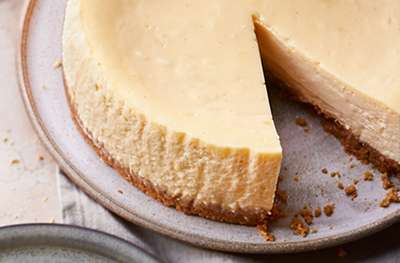0 added
Item price
£1.50Price per unit
£7.50/kg
Please note, we take every care to ensure the product, allergen and recipe information displayed is correct. However, should a product be unavailable, alternatives may be displayed and/or a substitution provided. If you have an allergy or intolerance, please always check the product label before use.
Preheat the oven to 180ºC, gas mark 4. Take a 20cm deep, round, loose-bottomed or springform cake tin, and wrap the base piece with a sheet of foil, tucking the edges underneath. This makes it easier to remove the cheesecake from the tin later on. Press it back into the tin and grease the sides generously with butter
Place the biscuits in a food processor and blitz until they resemble fine crumbs. Stir through the melted butter until coated, then press firmly into the base of the lined tin. Bake for 10 minutes, then remove from the oven and allow to cool.
In a large bowl with an electric hand mixer (or the bowl of a stand mixer, fitted with the paddle attachment), mix together the soft cheese, sugar, vanilla bean paste, lemon zest and cornflour. Use the mixer on the lowest speed setting, as you don’t want to incorporate too much air.
Beat the eggs together in a jug, then add the soured cream and mix until smooth. Combine the egg mix into the cream cheese mix using a spatula until well combined, then leave to sit for a few minutes to allow any bubbles to escape. Tap the bowl firmly on the countertop a few times to aid this process.
Pour the cheesecake mixture on top of the base and spread into an even layer using a spatula. Place the tin onto a baking tray to catch any leaks, then bake for 15 minutes. Turn the oven down to 140ºC, gas mark 1 and bake for 50-55 minutes more. When the cheesecake is ready, it should wobble like a jelly in the middle when gently shaken but should not look runny. Turn off the oven, leave the door slightly ajar and allow the cheesecake to cool inside the oven to room temperature.
Once cool, remove the cheesecake from the oven and run a palette knife around the inside to loosen. Chill overnight or at least 6 hours, before pushing out of (or unclipping) the tin, unwrapping the foil and transferring to a plate.
No water bath
If you’re an avid cheesecake baker, you may notice I’ve done away with a common method used when making baked cheesecakes – the water bath. This traditionally makes the cooking process gentler, but I found that a lower baking temperature works just as well and removes the fuss of creating the water bath. It also avoids the fear of a soggy bottom, as it’s almost impossible to wrap the cheesecake well enough to stop the water seeping in.
Baking the base
On my quest to develop a cheesecake with a smooth, creamy filling and crisp base, I found baking the base briefly helps it maintain its characteristic crunch once cooked.
Typical values per serving when made using specific products in recipe
Energy | 1,906kJ/ 458kcals |
|---|---|
Fat | 32g |
Saturated Fat | 19g |
Carbohydrates | 33g |
Sugars | 23g |
Fibre | 1.7g |
Protein | 8.3g |
Salt | 0.8g |
Book a slot to see product availability at your nearest Waitrose & Partners store
0 added
Item price
£1.50Price per unit
£7.50/kg0 added
Item price
£2.25Price per unit
£9/kg0 added
Item price
£1.95Price per unit
£7.80/kg0 added
Item price
£3.00Price per unit
£3/kg0 added
Item price
£4.25Price per unit
£65.39/kg0 added
Item price
£1.52Price per unit
38p each0 added
Item price
£1.85Price per unit
30.8p each0 added
Item price
90pPrice per unit
£6/litre